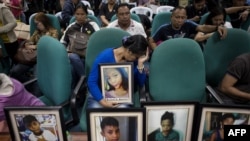ຟິລິບປິນ ໄດ້ປະກາດພາວະສຸກເສີນແຫ່ງຊາດ ກ່ຽວກັບການລະບາດຂອງໄຂ້ເລືອດ
ອອກ ໂດຍກ່າວວ່າ ພະຍາດທີ່ມີຍຸງເປັນພາຫະດັ່ງກ່າວ ໄດ້ເຮັດໃຫ້ມີຜູ້ເສຍຊີວິດແລ້ວ
ຢ່າງໜ້ອຍ 622 ຄົນ ເທົ່າທີ່ຜ່ານມາໃນປີນີ້.
ມີຜູ້ຕິດເຊື້ອໄຂ້ເລືອດອອກ ຫຼາຍກວ່າ 146,000 ກໍລະນີ ນັບແຕ່ເດືອນມັງກອນ ຫາ
ວັນທີ 20 ກໍລະກົດ ປີນີ້ ຊຶ່ງໄດ້ເພີ້ມຂຶ້ນ 98 ເປີເຊັນ ຈາກໄລຍະນຶ່ງປີກ່ອນ ອີງຕາມ
ລັດຖະມົນຕີກະຊວງສາທາລະນະສຸກ ທ່ານແຟຣນຊິສໂກດຸເກ ໄດ້ກ່າວລາຍງານ
ຜ່ານທາງໂທລະພາບ ໃນວັນອັງຄານວານນີ້.
ທ່ານກ່າວວ່າ ການປະກາດຈະອະນຸຍາດໃຫ້ບັນດາລັດຖະບານທ້ອງຖິ່ນ ໃຊ້ທຶນສຸກ
ເສີນເພື່ອຮັບມືກັບພະຍາດດັ່ງກ່າວ.
ໄຂ້ເລືອດອອກ ແມ່ນມີອາການຄ້າຍຄືກັບໄຂ້ຫວັດທີ່ຮ້າຍແຮງ ຮວມທັງເຈັບຂໍ້ຕໍ່ ວິນ
ຫົວຢາກຮາກ ອອກຕຸ່ມ ແລະເຮັດໃຫ້ມີບັນຫາໃນການຫາຍໃຈ ເລືອດອອກ ແລະອະ
ໄວຍະວະລົ້ມແຫຼວ ໃນກໍລະນີທີ່ຮ້າຍແຮງ.
ມັກຈະພົບເຫັນໃນບັນດາປະເທດເຂດຮ້ອນຢູ່ໃນທົ່ວໂລກ.
ຟິລິບປີນໄດ້ດິ້ນລົນເພື່ອຄວບຄຸມການລະບາດຂອງເຊື້ອໄວຣັສດັ່ງກ່າວ ນັບແຕ່ໄດ້
ຢຸດການສັກຢາວັກຊິນ Dengvaxia ໃນທ້າຍປີ 2017 ສອງປີຫຼັງຈາກທີ່ຟີລິບປິນ ໄດ້
ກາຍມາເປັນປະເທດເອເຊຍທຳອິດ ທີ່ອະນຸມັດໃຫ້ຂາຍຢາດັ່ງກ່າວໄດ້.
ລະຫວ່າງປີ 2016 ແລະ 2017 ໄດ້ມີການບໍລິຈາກຢາໃຫ້ແກ່ພວກເດັກນ້ອຍເກືອບ
ນຶ່ງລ້ານຄົນ ຜ່ານໂຄງການສັກຢາຢູ່ໂຮງຮຽນ ແຕ່ໄດ້ຖືກໂຈະຫລັງຈາກເດັກນ້ອຍ 14
ຄົນ ໄດ້ເສຍຊີວິດ.
ບໍລິສັດຢາຝຣັ່ງ Sanofi ທີ່ໄດ້ພັດທະນາວັກຊິນນີ້ ແຕ່ນັ້ນມາໄດ້ຮັບຮູ້ວ່າ ຄົນທີ່ບໍ່ມີ
ປະຫວັດຕິດເຊື້ອພະຍາດໄຂ້ເລືອດອອກມາກ່ອນ ອາດສາມາດພັດທະນາເຊື້ອໄວຣັສ
ຊະນີດທີ່ຮ້າຍແຮງຂອງພະຍາດນີ້ໄດ້.
ກະຊວງສາທາລະນະສຸກຟິລິບປິນ ກ່າວວ່າ ຕົນຈະເພັ່ງເລັງໃສ່ການຊອກຫາ ແລະ
ທຳລາຍບ່ອນອອກແມ່ແຜ່ລູກຂອງຍຸງລາຍ.
ບັນດາປະເທດອື່ນໆໃນເອເຊຍ ກໍມີລາຍງານການເພີ້ມຂຶ້ນຂອງກໍລະນີໄຂ້ເລືອດອອກ
ໃນປີນີ້ ອີງຕາມອົງການອະນາໄມໂລກ ຫຼື WHO. ມາເລເຊຍກ່າວວ່າ ມີຜູ້ຕິດເຊື້ອ 62,
421 ກໍລະນີ ມາເຖິງວັນທີ 29 ມິຖຸນາ ຮວມທັງ 93 ຄົນໄດ້ເສຍຊີວິດ ປຽບທຽບໃສ່
32,425 ກໍລະນີ ກັບ 53 ຄົນເສຍຊີວິດໃນໄລຍະດຽວກັນຂອງປີແລ້ວນີ້. ຫວຽດນາມ
ໄດ້ມີ 81,132 ກໍລະນີ ໂດຍມີລາຍງານສີ່ຄົນ ເສຍຊີວິດ ປຽບທຽບໃສ່ 26,201 ກໍລະ
ນີ ຮວມທັງຫົກຄົນເສຍຊີວິ ດໃນໄລຍະດຽວກັນໃນປີ 2018.
Philippines has declared a national dengue epidemic, saying the mosquito-borne disease has killed at least 622 people so far this year.
More than 146,000 cases were recorded from January to July 20 this year, a 98% jump from a year ago, Health Secretary Francisco Duque said in a televised briefing Tuesday.
He said the declaration will allow local governments to use emergency funds to combat the disease.
Dengue can cause severe flu-like symptoms, including joint pain, nausea, rash and can cause breathing problems, hemorrhaging and organ failure in severe cases.
It is commonly found in tropical countries worldwide.
Philippines has struggled to contain the virus since it stopped using the vaccine Dengvaxia in late 2017, two years after becoming the first Asian country to approve it for commercial sale.
Between 2016 and 2017, was distributed to almost a million children through a school immunization program. It was halted after 14 children died.
The French drug company Sanofi, which developed the vaccine has since admitted that people with no prior history of dengue infection could develop a more severe form of the disease.
The Philippines heath department said it will focus on finding and destroying mosquito breeding sites.
Other Southeast Asian countries have also reported an upsurge in dengue cases this year, according to the World Health Organization. Malaysia has registered 62,421 cases through June 29, including 93 deaths, compared to 32,425 cases with 53 deaths for the same period last year. Vietnam had 81,132 cases with four deaths reported, compared to 26,201 cases including six deaths over the same period in 2018.





